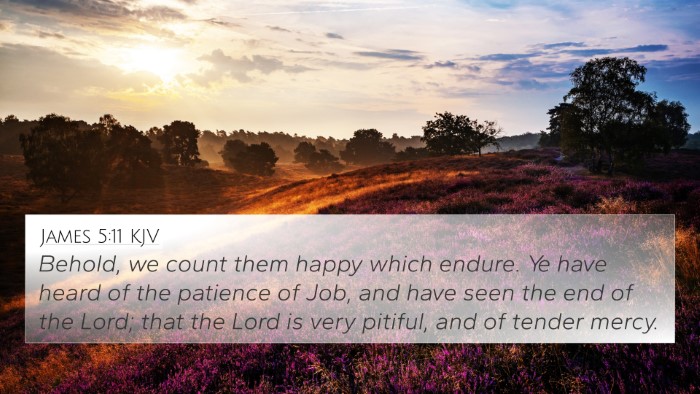Understanding Job 34:36
Job 34:36 states: "My desire is that Job may be tried unto the end because of his answers for wicked men." This verse illustrates the depth of the debate between Job and his friends regarding the nature of suffering and divine justice. The commentary on this verse offers insightful reflections from numerous public domain sources, including interpretations by Matthew Henry, Albert Barnes, and Adam Clarke.
Interpretation from Matthew Henry
Matthew Henry emphasizes the importance of divine justice and the integrity of God’s judgment. He sees this verse as expressing a sentiment that God desires to establish justice in all matters concerning Job. In Henry’s view, trials refine faith and expose the true nature of one’s character.
Insights from Albert Barnes
Albert Barnes focuses on God's justice and the fervent hope that Job's case reflects. He explains that Job’s friends view his suffering as a direct result of his wickedness, while the intention behind this verse is to highlight the overarching idea that suffering does not always correlate with wrongdoing. Barnes argues that God’s testing of Job serves a higher purpose beyond simple retribution.
Adam Clarke's Contribution
Adam Clarke provides a more contextual analysis, underscoring the dialogue between Job and his companions. Clarke notes that the phrase "my desire" emphasizes the speaker’s wish for a thorough examination of Job's character and motives. He reflects on the necessity of understanding Job’s plight in light of the broader theological theme of undeserved suffering.
Connections Between Bible Verses
This verse can be cross-referenced with several other scriptures that discuss suffering, justice, and divine testing. Below, we explore relevant connections:
- James 1:12: "Blessed is the man who perseveres under trial..." - Reflects the blessing that comes from enduring difficulties.
- 1 Peter 5:10: "... after you have suffered a little while, will himself restore you..." - Emphasizes restoration after suffering.
- Hebrews 12:6: "For the Lord disciplines the one he loves..." - Highlights God's discipline as a sign of his love.
- Romans 5:3-4: "...we rejoice in our sufferings, knowing that suffering produces endurance..." - Outlines the purpose of suffering in developing character.
- Psalm 119:71: "It is good for me that I was afflicted, that I might learn your statutes." - Acknowledges the benefits of affliction for spiritual growth.
- 2 Corinthians 12:9: "But he said to me, 'My grace is sufficient for you...'" - Encourages believers to rely on God's grace amid trials.
- Isaiah 48:10: "Behold, I have refined you, but not as silver; I have tried you in the furnace of affliction." - Connects undergoing trials with purification and refinement.
Thematic Bible Verse Connections
The themes of suffering, divine justice, and human endurance link Job 34:36 with many other Bible verses. The examination of Job's character serves not only to test him but to provoke discussions on why good people suffer—a question that resonates throughout scripture. This is illustrated by the following thematic connections:
- The justice of God in suffering – explored in verses like Deuteronomy 32:4.
- Endurance and character building – reflected in Romans 5:3-5.
- Divine vindication of the faithful – as seen in Psalm 26:1.
Tools for Bible Cross-Referencing
In studying this verse and its many connections, utilizing tools for cross-referencing can deepen understanding. Several resources available include:
- Bible concordance – a compilation of verse references organized by keywords.
- Bible cross-reference guide – offers thematic relationships and connections between verses.
- Cross-reference Bible study methods – practical approaches to exploring related verses.
Bible Verse Parallels and Inter-Biblical Dialogue
Job 34:36 does not stand alone; it invites readers to engage in inter-Biblical dialogue, connecting themes across both the Old and New Testaments. This study of parallels invites believers to uncover deeper insights into God's nature and human experience.
Conclusion
Understanding Job 34:36 allows for a rich exploration of profound themes such as suffering, justice, and faithfulness. By employing cross-referencing techniques and considering insights from classical commentators, readers can gain a fuller understanding of this complex dialogue. The journey through Job's trials stimulates reflection on our struggles and the various biblical teachings that guide us through affliction.











